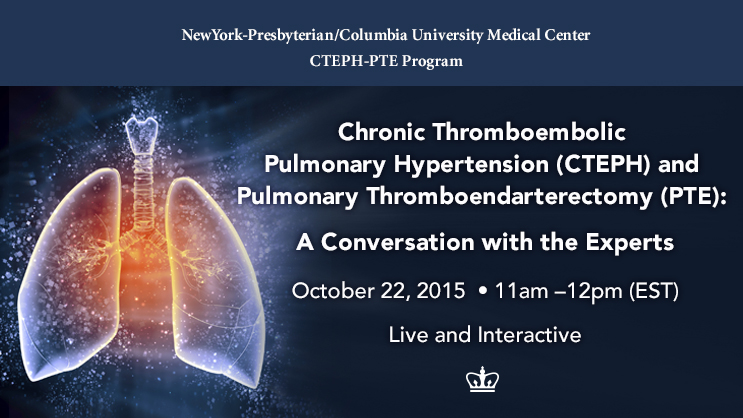
Click Here to Watch the Webinar »
Faculty
Matthew D. Bacchetta, M.D., M.B.A
Director, PTE Program at Columbia-NYP
Surgical Director, Pulmonary Hypertension Comprehensive Care Center at Columbia-NYP
Associate Professor of Surgery at CUMC
Erika Berman Rosenzweig, M.D. (Moderator)
Medical Director, Pulmonary Hypertension Comprehensive Care Center at Columbia-NYP
Associate Professor of Pediatrics in Medicine at CUMC
Marc Dickstein, M.D.
Professor of Anesthesiology at CUMC
Andrew Eisenberger, M.D.
Assistant Professor of Medicine at CUMC
Program Desciption
CTEPH and PTE: A Conversation with the Experts is a non-CME webinar discussion, which will focus on education leading to improved patient care and better outcomes.
Target Audience
This activity is designed for surgeons, primary care physicians, intensivists, pulmonologists, cardiologists, and hematologists and anesthesiologists.
Educational Needs Assessment
Chronic Thromboembolic Pulmonary Hypertension (CTEPH) occurs when there is incomplete resolution of a pulmonary embolism (PE) in nearly 4% of PE patients. Others may develop CTEPH following deep vein thrombosis or even after an unknown event. Understanding the signs and symptoms of CTEPH especially in those with pre-disposing conditions is extremely important, as there is a high risk of mortality if left untreated. Further, there is a potential surgical cure with pulmonary thromboendarterectomy (PTE) available in CTEPH-PTE specialty centers, for those eligible, and a novel medical treatment available for inoperable or post-operative patients with residual pulmonary hypertension. Knowing how to initiate a diagnostic work up and determine whether the patient requires specialized treatment is essential. Having a solid understanding of the key treatment paths will lead to improved patient outcomes.
Learning Objectives
At the end of this program, the attendees will be able to:
- Recognize the signs of CTEPH and initiate the appropriate diagnostic work up for CTEPH.
- Identify the medical and surgical treatment options and their efficacy.
